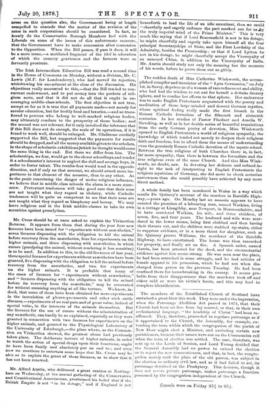The members of the Established Church of Scotland have sustained
a great blow this week. They were under the impression, when the Patronage Abolition Act passed in 1874, that their Church had been set free from lay control, or that, in their own ecclesiastical language, " the headship of Christ " had been re- affirmed. They, therefore, proceeded to regulate patronage as if it appertained to the Church, the Assembly, for example, ex- tending the term within which the congregation of the parish of New Deer might elect a Minister, and excluding certain new parishioners, because their names were not on the Communion roll when the term of election was settled. The case, therefore, was sent up to the Lords of Session, and Lord Young decided that the General Assembly had no power to extend the election or to reject the new communicants, and that, in fact, the congre- gation merely took the place of the old patron, was subject in the election to ordinary civil law, and as it had failed to act, its patronage devolved on the Presbytery. This decision, though it does not revive private patronage, makes patronage a function possessed by the congregation independent of the Church.


































 Previous page
Previous page